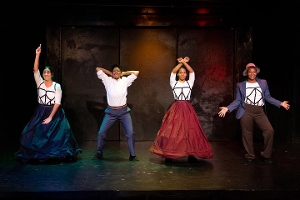Student Blog: “We Have Always Been Here”- The Need for LGBTQIA+ History in Theatre
We don't learn about in school, so we may as well learn it in the theatre.
 It goes back to the days of Vsevolod Meyerhold- theatre has a social responsibility; that is, theatre has the responsibility to lift the voices and tell the stories of every kind of person and every community. Theatre is the most magical form of storytelling, and the possibilities for just how these stories can be told are endless. Having just had the wonderful opportunity to see The Anthropologists' No Pants in Tucson (a devised work by and for the queer and feminist community), I've started thinking about how much the theatre world needs more of this kind of work, this queer-focused and queer-based work. This is the kind of work whose main objective is to tell the stories of a community that still struggles to be heard. I saw the most beautiful representation of trans people and queer people onstage, and it felt so refreshing and reassuring to see how possible it is to tell stories we've never heard but should hear. After learning that each vignette in this particular piece is based on true stories, I realized that there are probably just thousands of other stories that were never so much as examined that are just waiting to be told onstage.
It goes back to the days of Vsevolod Meyerhold- theatre has a social responsibility; that is, theatre has the responsibility to lift the voices and tell the stories of every kind of person and every community. Theatre is the most magical form of storytelling, and the possibilities for just how these stories can be told are endless. Having just had the wonderful opportunity to see The Anthropologists' No Pants in Tucson (a devised work by and for the queer and feminist community), I've started thinking about how much the theatre world needs more of this kind of work, this queer-focused and queer-based work. This is the kind of work whose main objective is to tell the stories of a community that still struggles to be heard. I saw the most beautiful representation of trans people and queer people onstage, and it felt so refreshing and reassuring to see how possible it is to tell stories we've never heard but should hear. After learning that each vignette in this particular piece is based on true stories, I realized that there are probably just thousands of other stories that were never so much as examined that are just waiting to be told onstage.
Queer and trans people have always been here. Their stories, unfortunately, have just gone unheard for the most part. But through collaborative work, rigorous dramaturgy, and a willingness to be transparent, these stories can come to life onstage, and the triumphs that come along with it are infinite. Not only could audience members feel safe, heard, and seen, but trans and queer theatre creators could finally start to take up more of the space which they deserve to take.
In the same vein of Shakespeare writing his history plays and having them performed, the queer community can and should write about their history and have them performed. Sure, we have plenty of well-known and lesser-known works of theatre focused on the queer experience that span decades in the twentieth century, but the surface has barely been scratched with what has been produced. We know the twentieth- and twenty-first century works like Indecent, The Children's Hour, or In the Next Room, but we don't know the real-life nineteenth-century experiences (under laws set by the government) that preceded these stories. Shouldn't we be more familiar with these? Shouldn't those who tell stories know the roots of the communities for which they're creating?
The answer is absolutely. History makes for a pretty good story, so let's make an effort to know it and share it.
Videos


